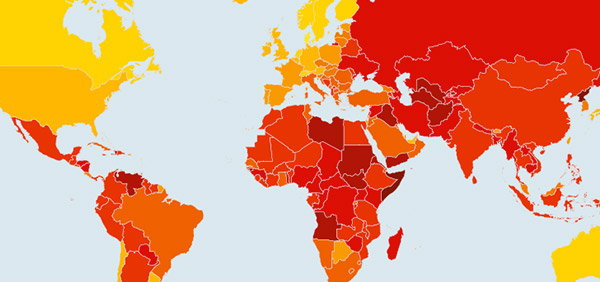While its ranking moved slightly in a positive direction, Guyana is still listed in the very corrupt category in the Transparency International Corruption Perceptions Index.
In the 2014 results released this morning, Guyana remains far behind its Caricom peers placing 124th out of 175 countries. The only Caricom country that is doing worse than Guyana is Haiti which placed 161. Guyana and Haiti have traditionally been at the bottom of the rankings.
A country or territory’s score indicates the perceived level of public sector corruption on a scale of 0 (highly corrupt) to 100 (very clean). Guyana’s score this year was 30 compared to 27 last year and 28 the year before.
By contrast, Barbados has the highest Caricom ranking with a score of 74 and a rank of 17. The Bahamas is ranked at 24 with a score of 71, St Vincent and the Grenadines has a rank of 29 and a score of 67, Dominica is ranked at 39 with a score of 58.
Both Jamaica and Trinidad are ranked at 85 with a score of 38.
The Jagdeo and Ramotar administrations have been beset by concerns over rampant corruption and the country’s ranking on TI’s index has been very poor.
Noting Guyana’s ranking, the local anti-corruption body, Transparency Institute Guyana Inc this morning renewed its previous calls on the government for the following:
· The urgent appointment of members of the Integrity Commission
· The urgent appointment of members of the decade awaited Public Procurement Commission
· Implement laws to regulate election campaign financing;
· Implement modern anti-corruption legislation;
· Implement whistle blowing legislation
· Enforce existing anti-corruption laws by investigating and prosecuting the corrupt;
· Strengthen existing anti-corruption institutions such as the Guyana Police Force for example which is weak and unable to counter serious white collar crime and corrupt activities;
· Ensure that all public moneys are placed to the credit of the Consolidated Fund, and no public expenditure must be incurred without Parliamentary approval;
· Ensure that all public officials in positions of trust are held accountable
· Ensure integrity in public life
· Stop the attacks, character assassination and vilification of citizens who have identified corruption as a serious problem that needs urgent and radical state intervention to stem its disastrous consequences for economic development
“TIGI further repeats its earlier calls for the larger members of civil society such as the Guyana Bar Association, the Guyana Association of Women Lawyers, Private Sector Commission, Guyana Manufacturing and Services Association, Georgetown Chamber of Commerce, the trade unions, etc to GET INVOLVED in combatting corruption by speaking out against corruption and being proactive within its own membership on tackling corruption and by partnering with us for collective efforts. These organizations have the potential to influence change but have been largely silent on the corruption epidemic which continues to have a debilitating effect on Guyana’s development. Corruption undermines democracy, weakens the rule of law and perpetuates poverty. Corruption hurts everyone who depends on the integrity of persons in a position of authority”, the statement further said.

“…to achieve positive change in the region, leaders need to urgently prioritise these key issues:
Putting an end to impunity for corruption by removing politics and bribe paying from police and justice institutions, and helping them become more professional. Also, mechanisms need to be created to protect citizens who want to speak out and act against corruption. Rebuilding citizens’ trust and strengthening law enforcement institutions are at the core of the insecurity problem in the region.
Opening political financing to public scrutiny so that it is known who finances which candidates and political parties with how much money. This measure should help in deterring organised crime from infiltrating politics and the state.
Tackling inequality by incorporating transparency as a central element of social investment, so that support is given to those most in need, and not following political criteria.
Creating public registries of the actual company owners to prevent the corrupt from hiding behind secret companies, laundering money and taking off with the loots of their corrupt schemes.”




